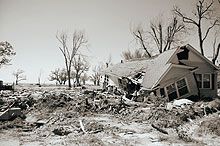Unfortunately, we often approach faith as something fully accomplished and mature or it is not true faith. We ask ourselves, "How can I believe when I still have some doubts?" Yet in the real world in which Jesus lived, faith was challenging, hard, dangerous, and always in process.
Jesus introduces us to a man who is desperate to see his son relieved of his physical and spiritual afflictions. Jesus reminds the father that "Everything is possible for one who believes." In a sudden burst of honest longing, the father replies, "I do believe; help me overcome my unbelief!" (Mark 9:16-27 NIV).
This is the struggle of real world faith - faith that admits to some doubts, but hopes in the powerful grace of God, notices the incredible love of Jesus, and has tasted the presence of God's Spirit. We know the sentiment. "I do believe; help me overcome my unbelief!"
Part of us wants our miracles before we believe. Yet reality usually demands that we believe and then we experience the confirmation of our faith after taking the risky steps of faith waiting for God's special blessing to happen. There is an element to true faith that requires us first to step out on the stormy waters, risk in the face of troubles, and push on in the face of doubts. Our faith is confirmed only after we have first trusted that Jesus will do what he has promised. We see this in the following interaction between Jesus and a government official.
As he traveled through Galilee, he came to Cana, where he had turned the water into wine. There was a government official in nearby Capernaum whose son was very sick. When he heard that Jesus had come from Judea to Galilee, he went and begged Jesus to come to Capernaum to heal his son, who was about to die.
Jesus asked, "Will you never believe in me unless you see miraculous signs and wonders?"
The official pleaded, "Lord, please come now before my little boy dies."
Then Jesus told him, "Go back home. Your son will live!" And the man believed what Jesus said and started home.
While the man was on his way, some of his servants met him with the news that his son was alive and well. He asked them when the boy had begun to get better, and they replied, "Yesterday afternoon at one o'clock his fever suddenly disappeared!" Then the father realized that that was the very time Jesus had told him, "Your son will live." And he and his entire household believed in Jesus. This was the second miraculous sign Jesus did in Galilee after coming from Judea (John 4:46-54).
Most of the folks in Jesus day were telling him, "Prove it first with a miracle, then we will believe." The reality, however, is that many folks who witnessed Jesus' miracles didn't come to faith. This "show me first" faith is what we all want, but is not the kind of faith that builds lasting trust because it carries less risk. So Jesus didn't do miracles on demand to convince his doubters.
The miracle happens for this government official only after he believed enough to leave, trusting that Jesus would do what he said - he "took Jesus at his word" and went home without the miracle believing that Jesus would keep his promise (John 4:50 NIV).
This is the real world I live in, how about you? Our journey back home to see the ultimate result of our faith feels a lot longer than the long walk back home the government official had. This journey can last days, weeks, months, or even years. Yet the principle is the same: we take Jesus at his word and stay to the path, trusting in the work of our Savior. And it is on this path, this sometimes long journey, that faith is deepened and grown until the Lord ultimately confirms it through our experience of God's mighty grace.
Faith in three stages:
- Hoping faith.
- Trusting faith.
- Experiencing faith.
If we are honest, most of us are in stages 1 or 2. Sometimes it is hard for us to hold onto faith in such times. But this is the nature and essence of faith. Paul said it this way:
For in this hope we were saved. But hope that is seen is no hope at all. Who hopes for what they already have? (Romans 8:24 NIV).
Or as Eugene Peterson puts it in The Message:
That is why waiting does not diminish us, any more than waiting diminishes a pregnant mother. We are enlarged in the waiting. We, of course, don't see what is enlarging us (Romans 8:24 MSG).
This is one reason why we so desperately need each other and the encouragement walking together down the road of faith can bring. So today, I want to encourage you to two things:
- Recognize that faith with doubts is still true faith - it is the essence of faith to stay on the journey until our faith is fully realized.
- Act on your need for the encouragement of other followers of Jesus to help you stay on the journey, and also their need for your encouragement - put yourself in a community encouragement and begin to encourage others.
Together, we can help each other continue on the journey, trusting in Jesus' promises, until we arrive safely home and our faith becomes sight!












Comments
Have thoughts on this article? Leave a comment